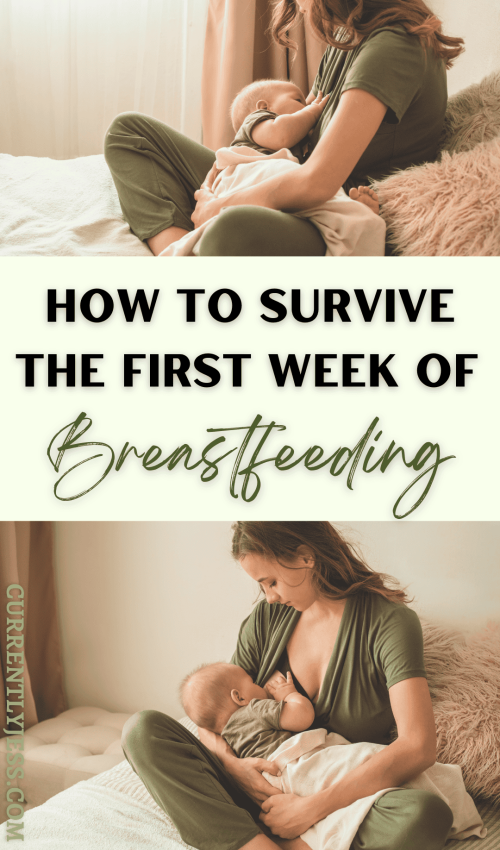Last updated on April 8th, 2025 at 10:13 pm
There’s something unforgettable about those first few days with your newborn. Between the snuggles, the sleep deprivation, and figuring out your baby’s needs, it’s a whirlwind. And if you’ve decided to breastfeed, you’re probably discovering that “natural” doesn’t always mean “easy.”
The truth is, that first week of nursing can be full of surprises. You might be dealing with sore nipples, a baby who struggles to latch, engorgement, or just the emotional weight of it all. It’s a learning curve for both of you, and that’s completely normal.
To help you feel a little more prepared (and a little less alone), I’ve put together seven simple tips—one for each day of that first week. These are the things I wish I’d known when I was starting out, and they just might make your early breastfeeding experience a little smoother.

Disclaimer: This post may contain affiliate links. If purchases are made through these links, I may receive a small commission at no additional cost to you. Thank you for supporting this site.
Why the First Week of Breastfeeding Feels So Hard
No one really prepares you for just how intense those first few days of breastfeeding can be. You might have read the books, taken the class, or watched the videos, but the reality of nursing a newborn hits differently when you’re sleep-deprived, sore, and trying to figure out what your baby needs in real time.
The first week is often the steepest part of the learning curve. Your baby is still figuring out how to latch, your milk supply is just starting to come in, and your own body is recovering from birth. Add in hormones, cluster feeding, and the emotional weight of becoming a mom (or doing it all over again), and it’s no wonder this stretch can feel overwhelming.
You’re not alone if you’re second-guessing yourself or wondering if it’s supposed to be this hard. The good news is that small adjustments can make a big difference, and support can help you feel more confident and less alone.
7 Tips for the First 7 Days of Breastfeeding
The first few days of breastfeeding can feel like a whole world of their own. Your body is recovering, your baby is learning, and nothing feels quite predictable. As a labor and delivery nurse, I’d been around a lot of breastfeeding journeys. But when it was my turn, I realized just how different it feels when you’re the one living it.
These are seven things that helped me get through that first week. I hope they offer a little comfort and clarity during those hazy, around-the-clock feeding days.
1. Start Breastfeeding as Soon as You Can
One of the questions I hear most often as a nurse is, “When should I start breastfeeding?” The answer is, honestly, as soon as possible. Many babies show hunger cues within the first hour of life, and that’s a great time to begin.
Nursing early helps your baby latch while their instincts are strongest, and it kickstarts your milk supply in those crucial first hours. Skin-to-skin contact not only calms your baby, but it also helps your body release the hormones that support milk production.
I always encourage moms to take full advantage of that Golden Hour. Keep your baby close, soak in those first quiet moments together, and try to nurse before the hustle of visitors and hospital routines start to pick up. That early connection can really set the tone for your breastfeeding journey.
2. Comfort Is Key When You’re Breastfeeding
Finding a comfortable position for both you and your baby is key to getting a good latch and making nursing feel more manageable. Your labor and delivery nurses, along with your postpartum team, should all be trained in lactation support. Depending on your hospital, there may also be a lactation consultant available during your stay—don’t hesitate to ask for help.
Try a few different nursing positions to see what works best for you. The cradle hold, football hold, and side-lying position are the most common, but there’s no one-size-fits-all approach. Use pillows or a nursing pillow to support your baby and take pressure off your arms, neck, and back.
Once you’re home, comfort continues to matter. Nursing in a noisy or cluttered space with no support around you can make everything feel harder. Set up a little breastfeeding area somewhere in your home. It could be in the nursery, your bedroom, or any quiet corner that feels peaceful and gives you some privacy.
I used a glider in the nursery and kept a small side table stocked with snacks, water, burp cloths, and anything else I might need. Sometimes I’d pop on an audiobook or watch a show while feeding. The calmer and more supported you feel, the more your baby will pick up on that energy too.
3. Watch for Baby's Hunger Cues
Your baby will give you signs when they’re ready to eat. Rooting, sucking on their hands, making sucking noises, or even bobbing their head toward the breast during skin-to-skin time are all early hunger cues. Try to feed your baby when you notice these signs, rather than waiting for them to cry. A baby who’s already upset can be much harder to latch and soothe.
Newborns need to feed often—usually 8 to 12 times in 24 hours, which works out to every 2 to 3 hours or so. That’s a helpful guide, especially during the early days when babies can be extra sleepy and hard to wake. But try not to get too caught up in the clock. Some babies cluster feed and want to nurse every hour for a stretch, while others might take longer breaks.
That first week is all about learning your baby’s rhythms. The more you tune in to their cues, the more confident you’ll feel responding to their needs as they change.
4. The Latch Can Make or Break Breastfeeding
Getting the latch right is one of the trickiest parts of breastfeeding, especially in the beginning. It takes practice, patience, and a little trial and error—for both you and your baby. Be gentle with yourself as you figure it out.
A good latch should feel comfortable (not painful) and allow your baby to feed effectively. Their mouth should be wide open, lips flanged outward like a fish, and their chin should be touching your breast with their nose still clear to breathe. You want them to take in not just the nipple but also a good portion of the areola, especially the part underneath.
A shallow latch can cause sore, cracked nipples, and over time it can lead to poor milk removal. That can start the frustrating cycle of low demand and low supply. If something feels off or painful, don’t hesitate to break the latch and try again.
Lactation consultants are a huge help with this. If you’re in the hospital, ask to see one before you go home. And if you’re already home, many offer virtual or in-home visits. It’s okay to ask for help. A little support can go a long way in making breastfeeding feel more doable.
5. Take Care of Yourself Too
Breastfeeding takes a lot out of you—literally. Your body needs extra fluids, calories, and rest to keep up with the demands of feeding a newborn. Try to drink plenty of water, eat nourishing meals, and sneak in rest whenever you can. I know that last part is easier said than done, especially in those first few days.
It’s not just about physical recovery, either. Breastfeeding can be emotionally intense, especially if it isn’t going the way you expected. Your mental health matters just as much as your milk supply. If you’re feeling overwhelmed, talk to someone. Lean on your partner, a friend, your mom, or a support group. You’re not in this alone, and there’s no shame in needing support.
6. What to Do When Breastfeeding Hurts
Let’s be honest, breastfeeding can hurt, especially in the beginning. Sore nipples and engorged breasts are incredibly common during those first few days, but that doesn’t mean you just have to suffer through it.
Some tenderness is normal as your body adjusts and your baby learns to latch, but pain that lasts the entire feed or leaves your nipples cracked or bleeding is a sign that something needs adjusting. Most often, it’s a latch issue. Try repositioning your baby, and if it still hurts, do not hesitate to ask for help from a nurse or lactation consultant. Nipple creams, silverettes, and letting your nipples air dry between feeds can help ease the discomfort.
Then there is engorgement, which often shows up around day three or four when your milk comes in. Your breasts may feel full, firm, or even hot and uncomfortable. That fullness can make it harder for your baby to latch well, which just adds to the stress. Feeding frequently, using gentle massage during nursing, or hand-expressing a little milk beforehand can bring relief. Cold compresses between feeds can help reduce swelling too.
Pain is common in the early days, but that does not mean you have to push through it alone. With a few small adjustments and the right support, things often improve quickly.
7. You’re Learning Too, and That’s Okay
Breastfeeding isn’t something you automatically know how to do—it’s something you learn, just like your baby is learning how to feed. It can be frustrating, exhausting, and emotional at first, especially if things aren’t going the way you expected.
Even as a nurse who teaches breastfeeding, I struggled when it came time to feed my own baby. I knew the basics, but in real life, it felt totally different. And that’s the part no one really prepares you for.
If you’re hoping to continue breastfeeding but find yourself overwhelmed, please know that you’re not alone. So many moms hit bumps in the first week. With the right support and a little patience, it usually gets easier. But no matter what path you end up taking—breastfeeding, formula, or a mix—you’re still doing what’s best for your baby by showing up and caring.
Give yourself some grace. You’re both new at this, and you’re doing more than enough.
Final Thoughts on Breastfeeding a Newborn
That first week of breastfeeding can feel like a blur of feeding sessions, emotions, and questions you didn’t even know you’d have. It’s a lot, and it’s okay if it doesn’t feel easy right away. You’re learning, your baby is learning, and every feeding is a step forward.
Whether you’re soaking up quiet moments or googling latch tips at 2 a.m., just know you’re not alone. These early days are full of adjustment, but they don’t last forever. Be gentle with yourself, ask for help when you need it, and trust that you’re doing a great job—even on the days that feel hard.









